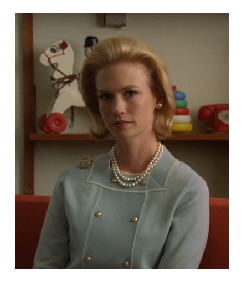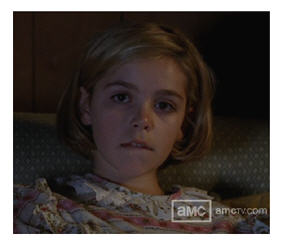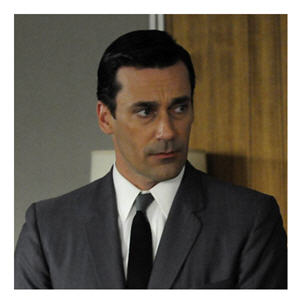It’s a morality tale, and all about shame. About warfare and its aftermath, honor and its value, private shame according to cultural standards of the times, and personal experiences of shame.
 In Mad Men‘s Season 4 Episode 5, The Chrysanthemum and the Sword, we feel the weight of the 1960s heavily; World Wart II is not so distant that Roger Sterling doesn’t bristle at the thought of doing business with the Japanese. He wants nothing to do with them. We see issues around the burgeoning awareness of a 10-year old girl, discovering her own body – and the swift, judgmental punishment meted out as a result. The sting of divorce persists, and the stigma of seeing a psychiatrist is illustrated with clarity.
In Mad Men‘s Season 4 Episode 5, The Chrysanthemum and the Sword, we feel the weight of the 1960s heavily; World Wart II is not so distant that Roger Sterling doesn’t bristle at the thought of doing business with the Japanese. He wants nothing to do with them. We see issues around the burgeoning awareness of a 10-year old girl, discovering her own body – and the swift, judgmental punishment meted out as a result. The sting of divorce persists, and the stigma of seeing a psychiatrist is illustrated with clarity.
Don has carried deep-seated shame all his life, over his impoverished beginnings, and subsequently, the false identity he’s worn. Shame may be newer for Betty – her husband’s infidelities, divorce, her children seemingly embarrassing her.
We’re also offered examples of deceit and honor in the ad agency’s affairs, strangely and effectively intertwined, as Don, Pete, and Peggy team up against Roger, in the best interest of the organization.
Doing business with the Japanese
The agency continues to need business. When an opportunity for Honda’s motorcycle account comes up, everyone in the firm wishes to pursue it. They’re all told to read the 1950s book, The Chrysanthemum and the Sword, in order to better understand Japanese symbolism and culture in a business context.
A side of Roger comes out that we haven’t seen; he fought in World War II. He lost friends. He insults the Honda businessmen, embarrasses himself and the ad agency.
We admire Roger for standing up for his beliefs, though Joan is quick to put them into perspective for him, urging that he move beyond his anger, saying:
You fought to make the world a safer place. And you won. And now it is.
Sally’s dilemma
How strange it must seem for some of us to consider that normal acts of sexual curiosity and development were punished, and not so long ago. Sally’s grief when her grandfather died was dismissed, her fears relative to the new baby were addressed only by her father, Don, who is no longer in the house. Betty is cold and self-absorbed. She replaced her child’s more affectionate parent with a sort of husband-father figure of her own. A man whom she moved into the family home and her bed as though nothing had happened at all.
 Sally feels isolated and confused. She has questions about men and women. She’s the object of her mother’s anger on many occasions, and has been since long before the divorce. (We assume Betty’s relationship with her own mother was less than ideal). As a child of divorce in the 1960s, Sally’s issues are ignored.
Sally feels isolated and confused. She has questions about men and women. She’s the object of her mother’s anger on many occasions, and has been since long before the divorce. (We assume Betty’s relationship with her own mother was less than ideal). As a child of divorce in the 1960s, Sally’s issues are ignored.
In this episode, when Sally cuts her hair (for attention), and then is sent home from a slumber party for “playing with herself,” was seen by another mother and promptly brought home.
Sally was made to feel ashamed. Betty, likewise. And there’s more shame ahead as the chews on the stigma of taking the child to a shrink. (Clever turn of events; we’ll see more of Betty’s background revealed through this process.)
Don’s shrewd moves
Don’s role seems to be damage control on all fronts in this episode.
When it becomes clear that something exception will be required following Roger’s outburst with the Honda executives, Don comes up with a plan to knock off his most irritating competition (Ted Shaw), and potentially to allow the Japanese to save face, and in a way, for Sterling Cooper Draper Pryce to save face.
 Pretending to go around the rules that Honda established for three competitive bids, SCDP feigns the shooting of a commercial, fakes out the competition, and then Don “withdraws” from the presentation process – in public – in front of the Japanese. In this manner, he impresses them by seeming to insist that a level playing field – theirs – is something he respects, and by honorably withdrawing. A sort of symbolic surrender, with head held high.
Pretending to go around the rules that Honda established for three competitive bids, SCDP feigns the shooting of a commercial, fakes out the competition, and then Don “withdraws” from the presentation process – in public – in front of the Japanese. In this manner, he impresses them by seeming to insist that a level playing field – theirs – is something he respects, and by honorably withdrawing. A sort of symbolic surrender, with head held high.
It’s a bold move, and it works – demonstrating the value and importance of honor, however that may be defined. And ironically, Don achieves this through deceit. The perfect mix for Dick Whitman/Don Draper. And continued proof that Mad Men‘s creators will continue to explore these characters and new scenarios, more than holding our interest.
Images courtesy AMCTV.com.

For more musings and reviews on Mad Men, pop by here.
© D A Wolf
Gosh I wish I had started watching this when it first came out. I feel like it’s too late to jump in now.
It’s not too late, Cathy! (Netflix!)
As a huge, huge lover of the Roger Sterling, I am so disturbed 🙁 I want my charming cad back!
He is a charmer in his own way, isn’t he? (Remember him in Sex and the City? He was the P-olitician Carrie dated after breaking up with Big in Season 2 (I think).